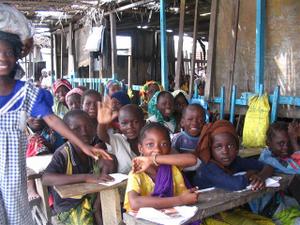The youngest of the Community of Sant'Egidio of Ngozi, a small town in the North of Burundi, few kilometres from the border with Rwanda, began, a few months ago, to be nearer to the poor elderly who live by begging around the school. The other members of the Community, adults and university students, supported them in this friendship. One Saturday after another, with the visits, but also with the parties together, they entered into the world of the elderly, and were able to discover the state of necessity in which many of them live, with their problems and their needs.
The first need is that of the house. Many old people are forced to live on the street without a shelter or guarantees. Then, why not use the summer months, free from school work, to give a house to the homeless elderly?
The whole Community got busy: collections to buy wood and bricks, height design, work shifts: the first two "building sites" were already started and almost concluded, while others are under construction. In the meantime, they make culture: the high school students of the Community are also planning to make a survey on the elderly who live on the two
hills near the school, to make a census of their number and know better their living conditions .
hills near the school, to make a census of their number and know better their living conditions .




.JPG)
.JPG)

.jpg)